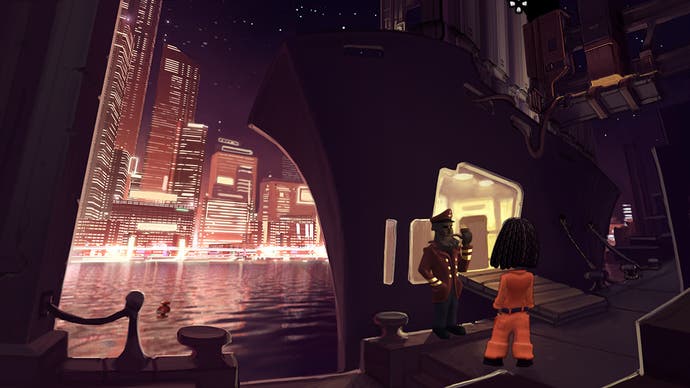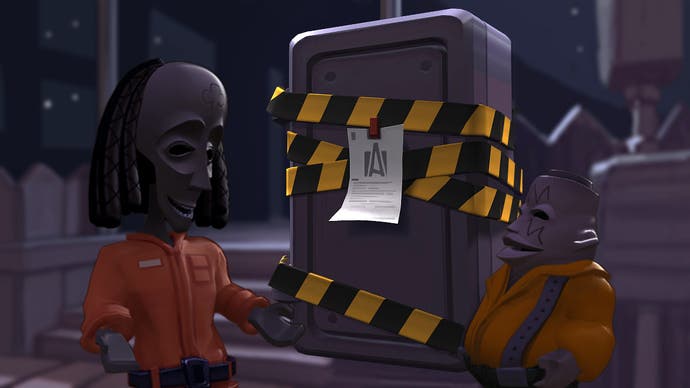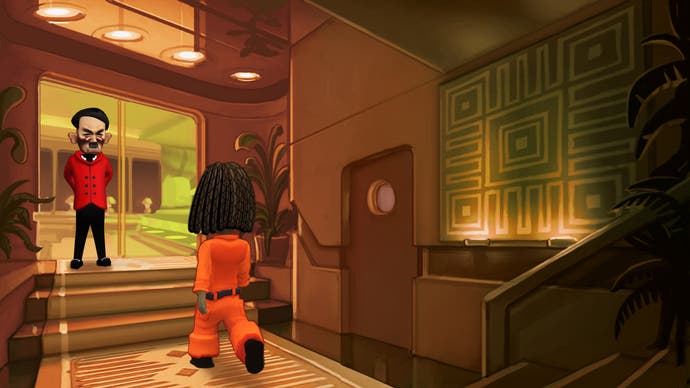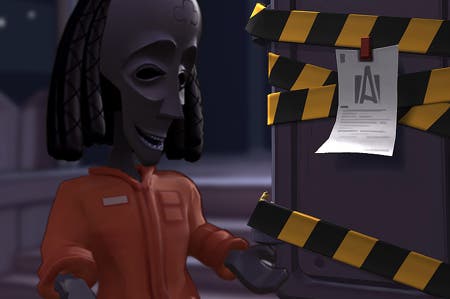The Journey Down: Chapter One Review
Out of Africa.
In many ways, Skygoblin's HD remake of its free point-and-click adventure, The Journey Down, is a throwback to the classic LucasArts games. It's got inventory puzzles, silly humour, exotic locales and a mystery shaping the plot. The one new thing it brings to the table is a cast modeled after African sculpture. It's refreshing to see - and Lord knows we could use more black characters who aren't criminals, athletes or bulky soldiers.
Unfortunately, The Journey Down's African theme is poorly integrated; it comes off feeling like an ethnic restaurant where the menu mostly consists of English cuisine. The character models are abstract, emotive and visually inspired, but it's impossible to ignore that this is a game made by a bunch of white dudes. Though their intentions seem pure, there are a few choices that don't sit well.

The two protagonists, Bwana and Kito, are based on statues from the Chokwe and Makonde tribes of Africa - yet they have Jamaican accents. Things get dicier when African masks are merged with Asian characters. It feels like these aesthetics were pasted on to a story that doesn't use them in any meaningful way. The character art suggests a window into an often underrepresented culture, but the reality is that this game could have starred anyone, and the African designs are merely for show.
This is a shame, as The Journey Down does an otherwise pretty good job of emulating the best point-and-click adventures from the '90s. It gets off to a promising start, with a pair of down-on-their-luck gas station attendants lamenting their financial woes. When a woman shows up offering them a healthy sum if they can charter her a flight, it's up to our heroes to fix their derelict seaplane by doing what adventure game protagonists do best: combining items.
The Journey Down's puzzles are largely inventory-based, but they usually make sense. There's no point where you need to combine a knife with a block of tofu to make a mask, or use a monkey as a wrench. Nor are the puzzles so obvious that you can breeze through them without thinking. Occasionally it falls victim to pixel-hunting, and I could have done with a few more non-inventory puzzles to liven things up, but by and large this is a refined rendition of its archaic influences.

This quality carries over into the writing. While rarely hilarious, The Journey Down is often good for a chuckle. Bwana and Kito's constant optimism in spite of their dire straits has plucky charm, and while this introductory episode is filled with lots of exposition, it develops an intriguing world with promises of spooky-sounding locales with slick names like "The Underland" and "The Edge".
The striking setting is brought to life through wonderfully evocative hand-painted backgrounds. We may not visit the metropolis of St. Armando yet, but it shines brilliantly in the background, establishing a visual contrast between the bright bustle of city life with our duo hustling at the harbour. The attic of their shop is appropriately moody, as it's laid dormant over the many years their father has been missing, and a ritzy yacht provides a spot of glitz.
I can't say I'm as fond of the voice-acting. Bwana and Kito are mostly well done, but other characters are can be cringe-inducing stereotypes on a par with the cartoonish Letitia from Deus Ex: Human Revolution. This wouldn't be so bad if you could turn the voices off, but you can't. The free version doesn't have voice-acting, which I think I prefer.

While The Journey Down contains all the elements of a great adventure, the storytelling isn't quite concentrated enough for the episode's scant length of about four hours. After an energetic intro, it quickly devolves into that most familiar of adventure game tropes; solve three tasks before you can set sail.
In form and function, this recalls the opening chapter of The Secret of Monkey Island, but lacks that game's spark. Where Guybrush's tongue-tied first meeting with Elaine instantly summed up who these characters were, Bwana's initial encounter with his love interest is rife with noir potential but mostly limits itself to exposition followed by her sitting in a chair saying, "Let me know when you're ready." The villains are equally underdeveloped, and all I know about them is that they're looking for a book and their head honcho sits behind a desk on what appears to be a set from Blade Runner.
You might not go into The Journey Down expecting an anthropology lesson, but it would be nice if it sparked the same sort of enthusiasm for the culture it's aping that Grim Fandango did with its Mexican heritage. Despite this, it's a solid adventure game with high production values and sharp design. There's a courageous allure to an indie team trying to stand toe-to-toe with LucasArts' masterpieces, and that they've come this close with their first entry in the genre is no minor accomplishment. Here's hoping the next chapter gives has a little more African flavour.

